Thomas James Richards, Diaries, Transcript Vol. 3, 26 January to 8 November 1916 - Part 29
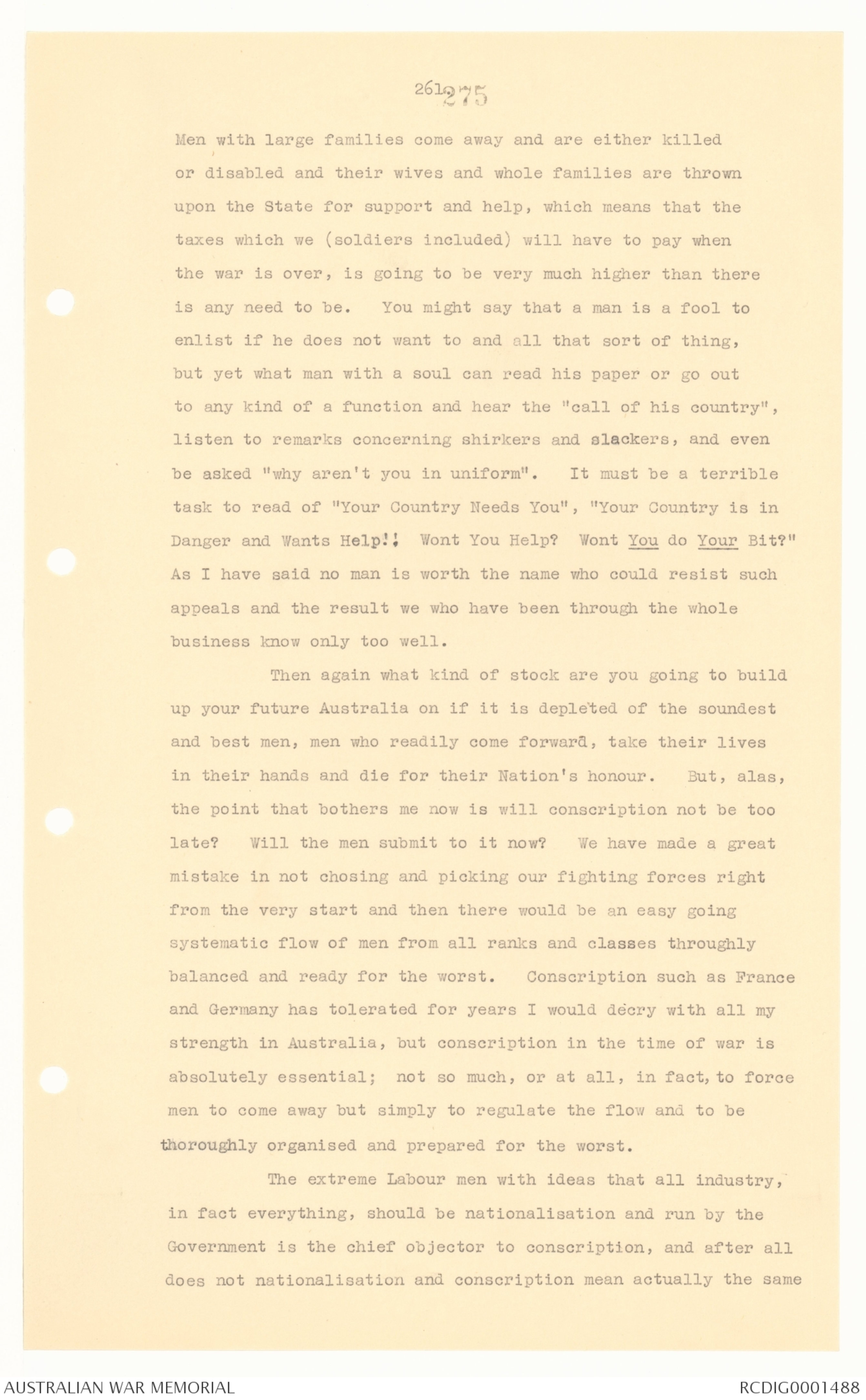
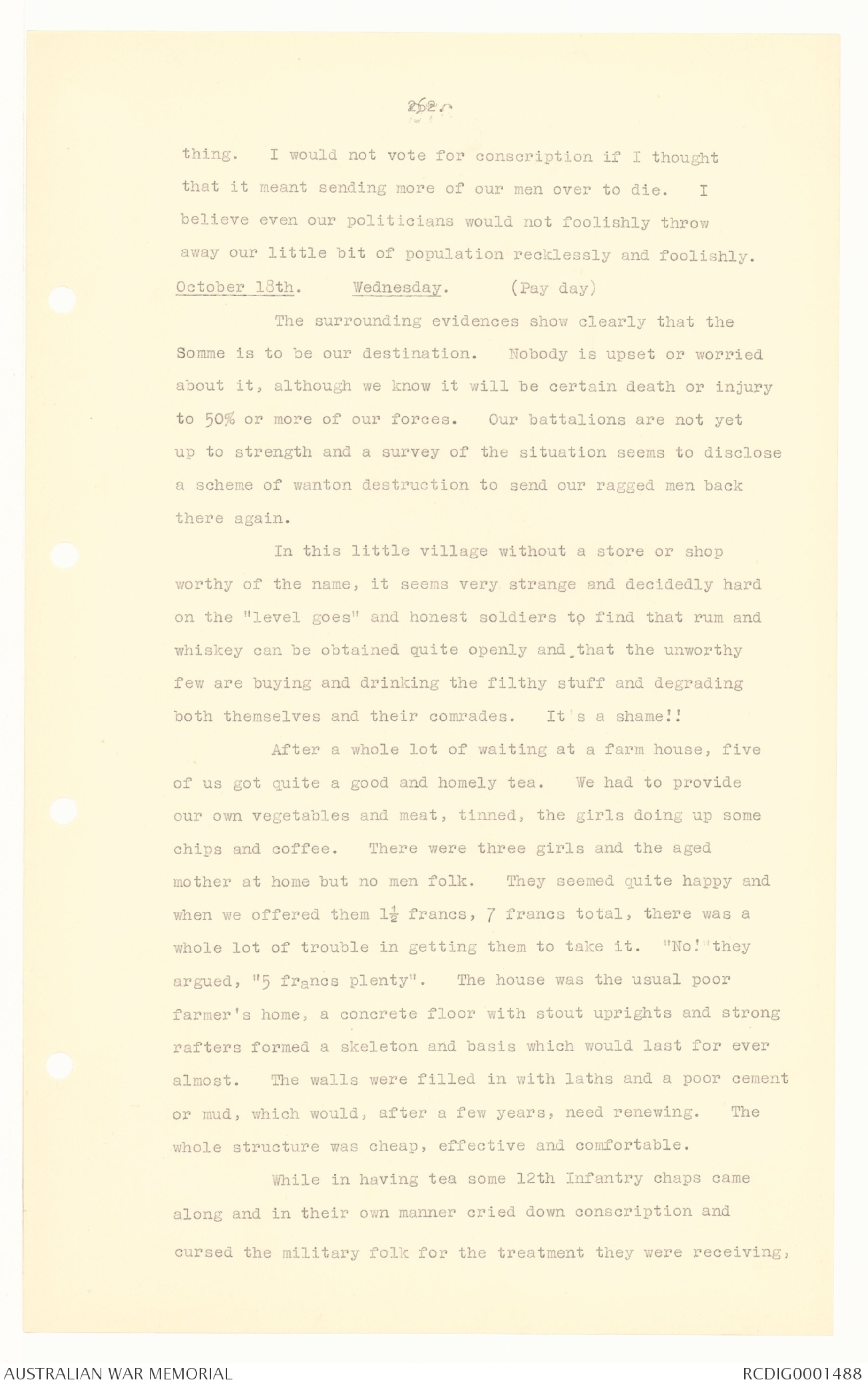
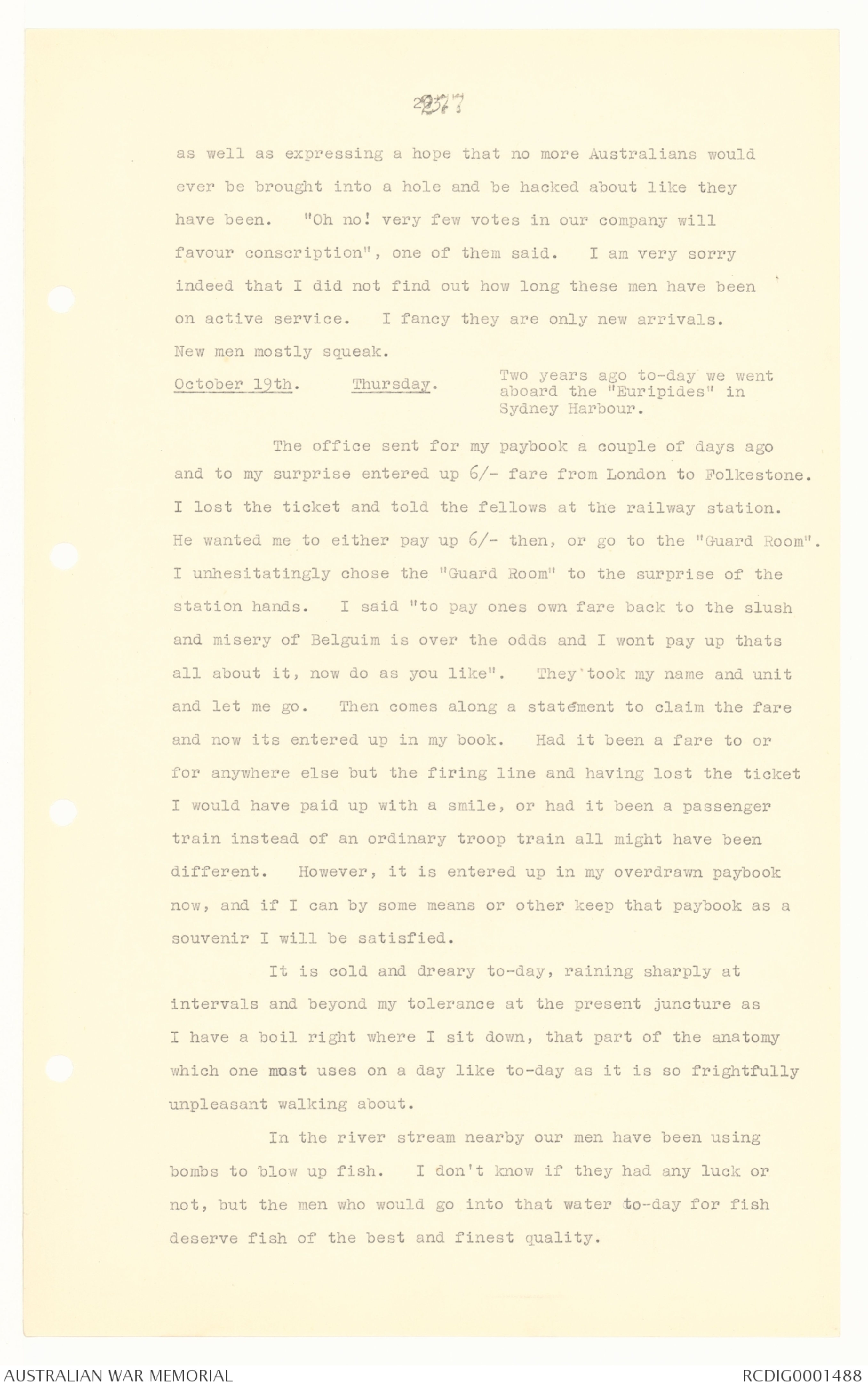
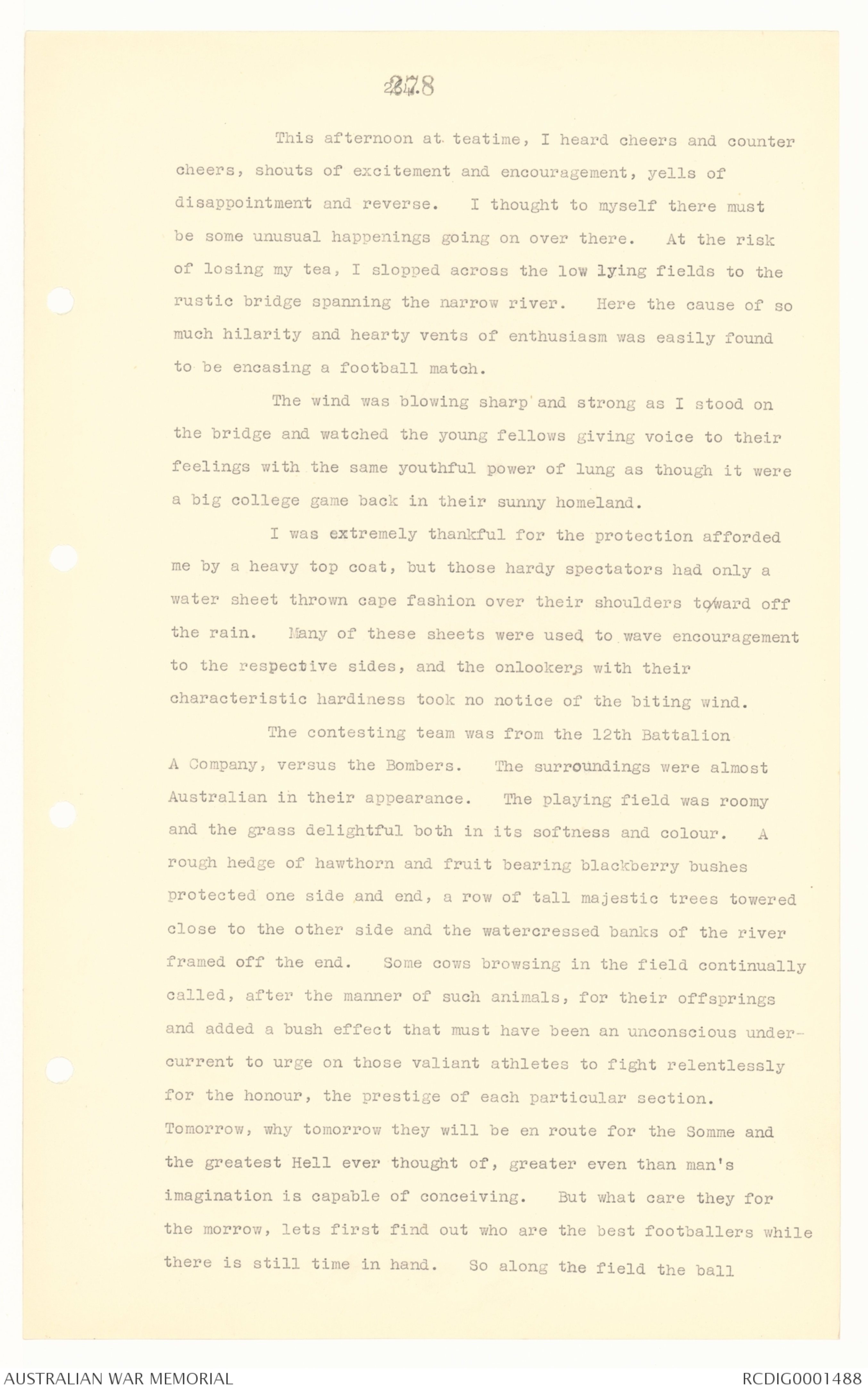
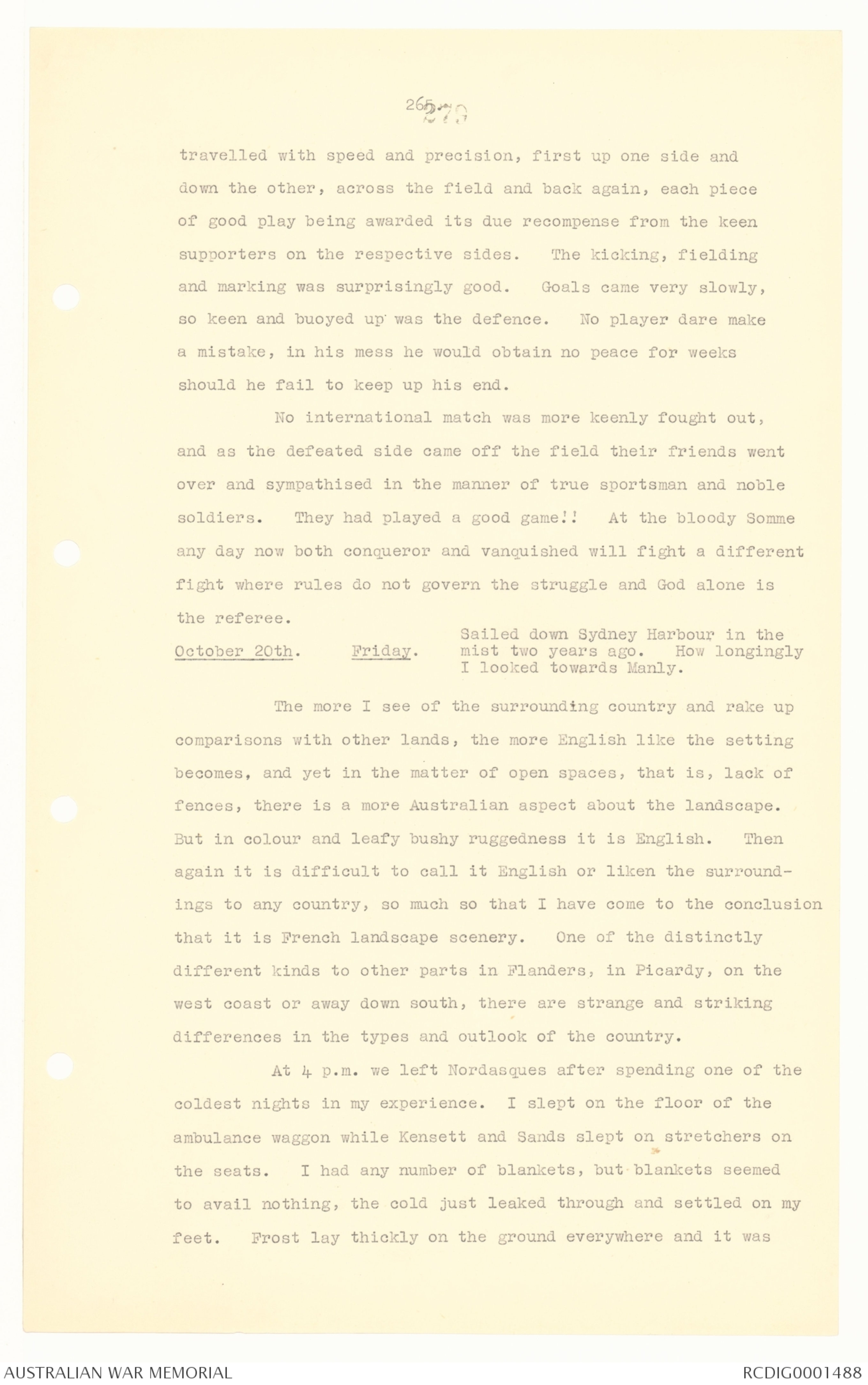
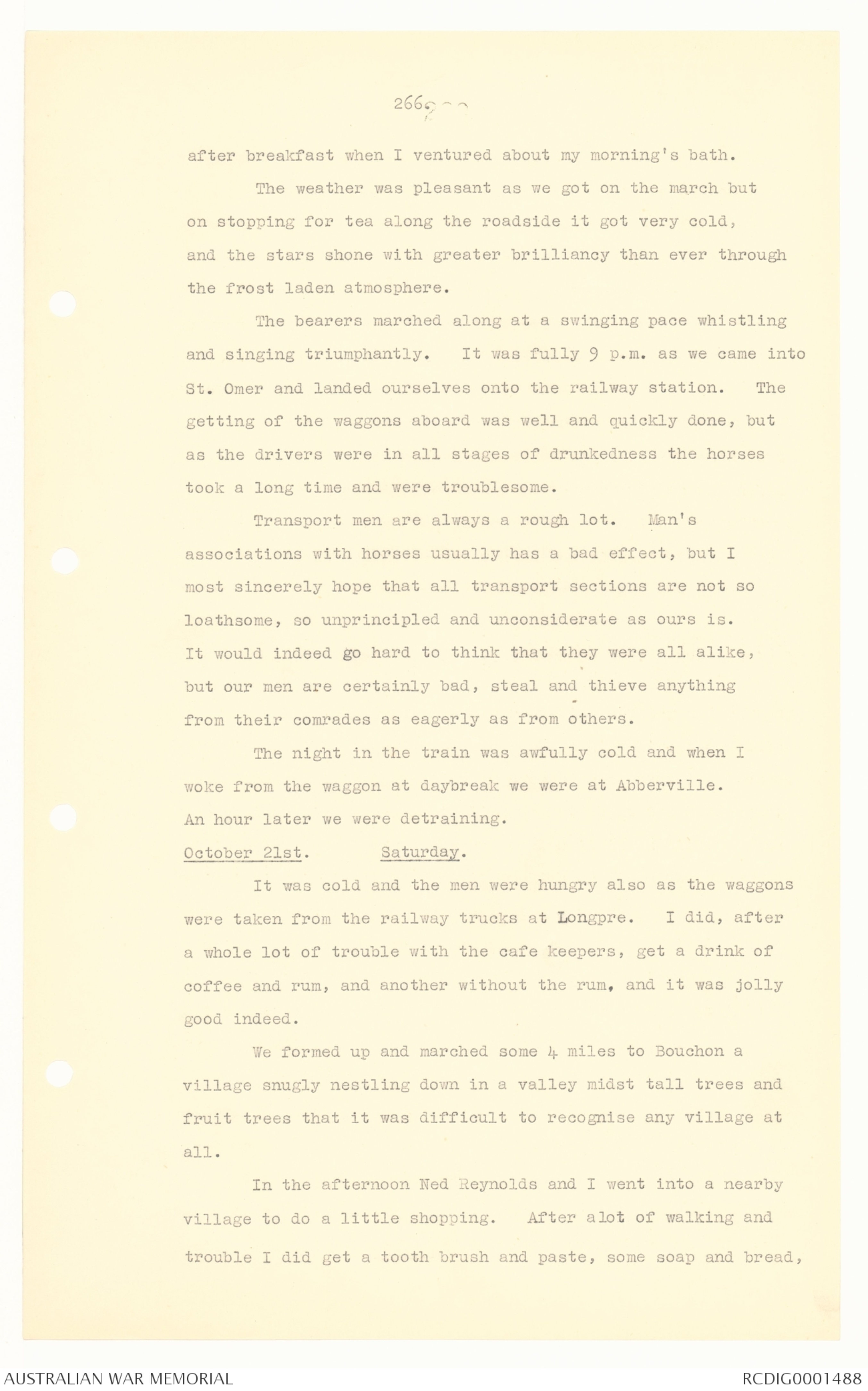
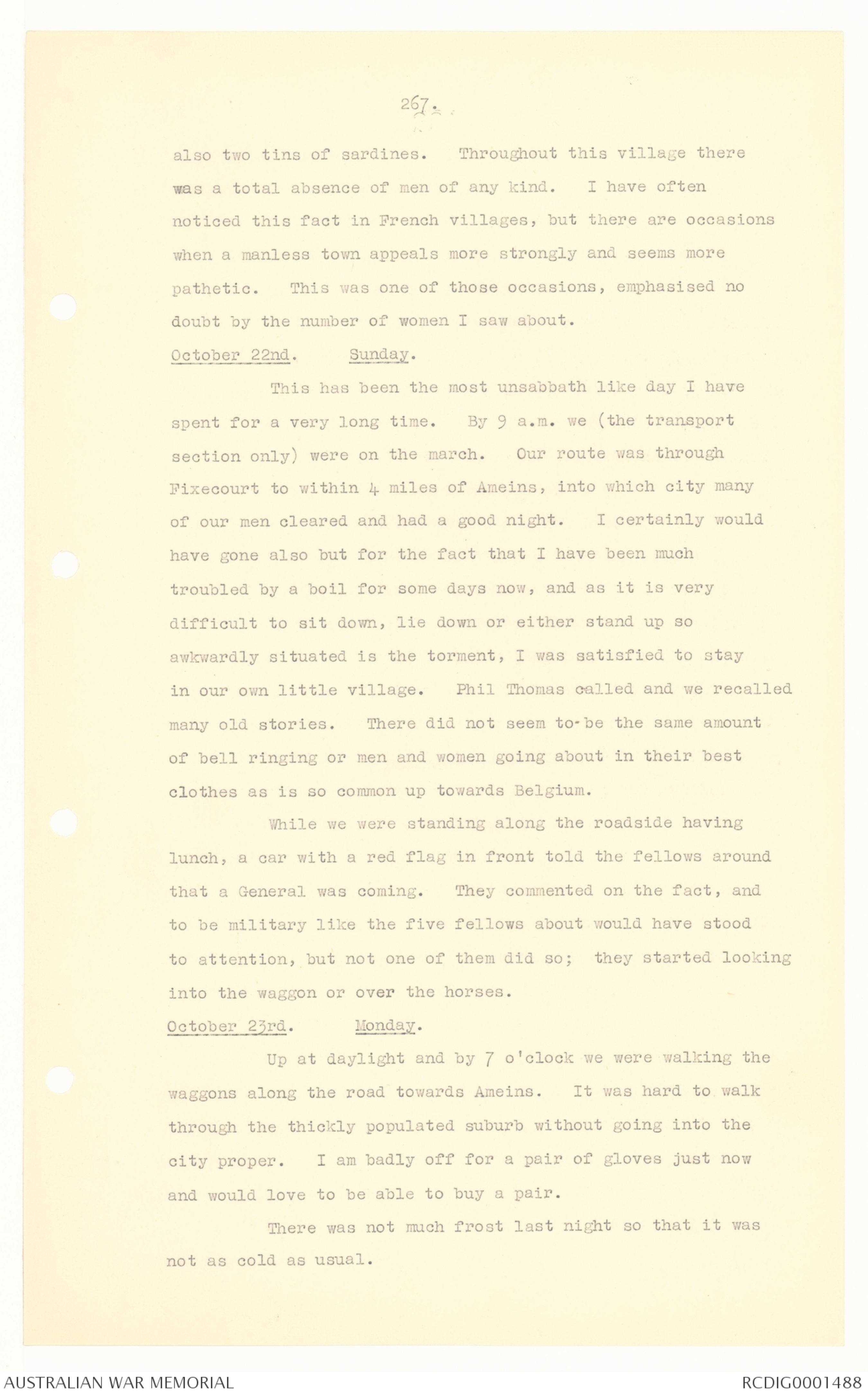
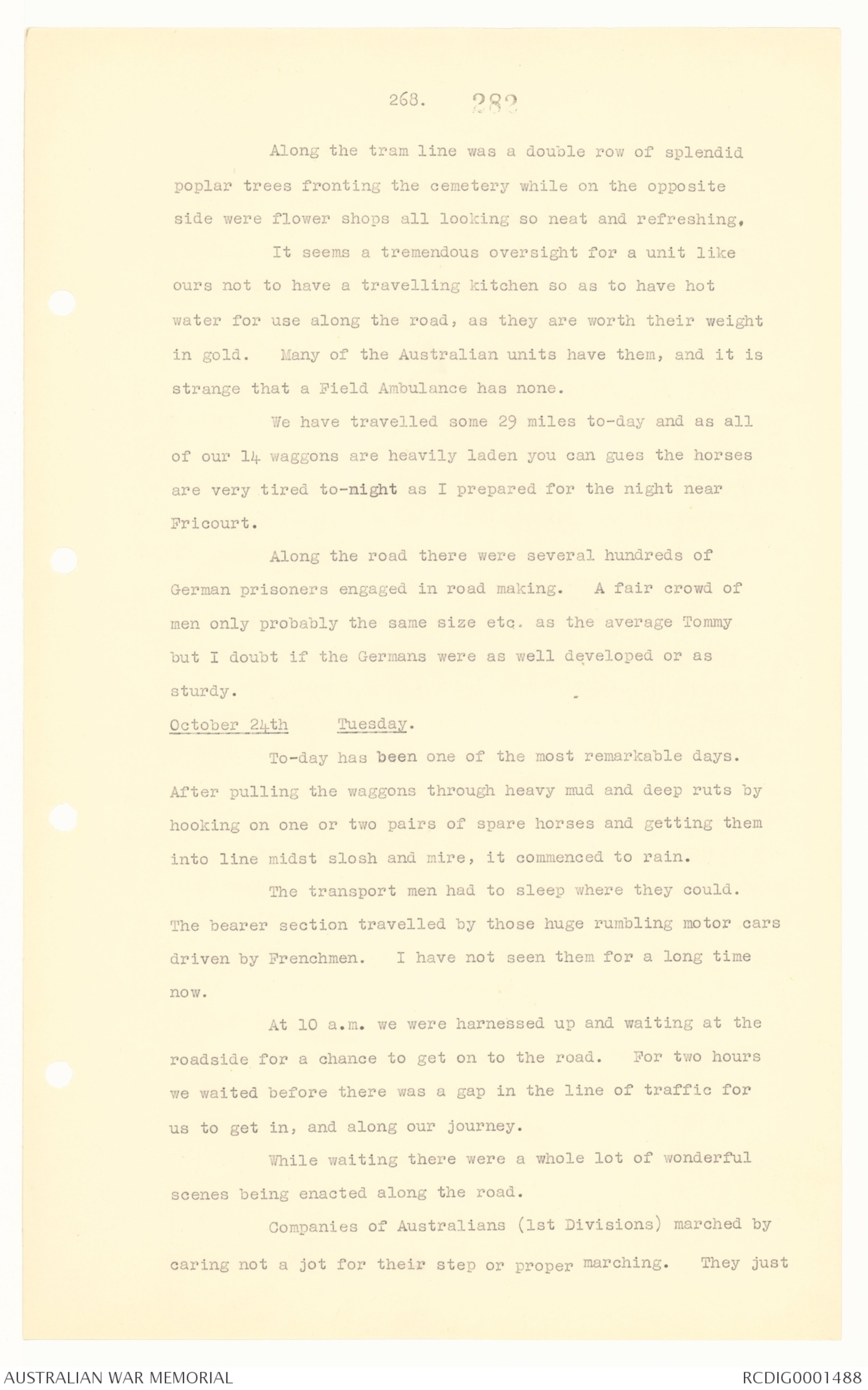
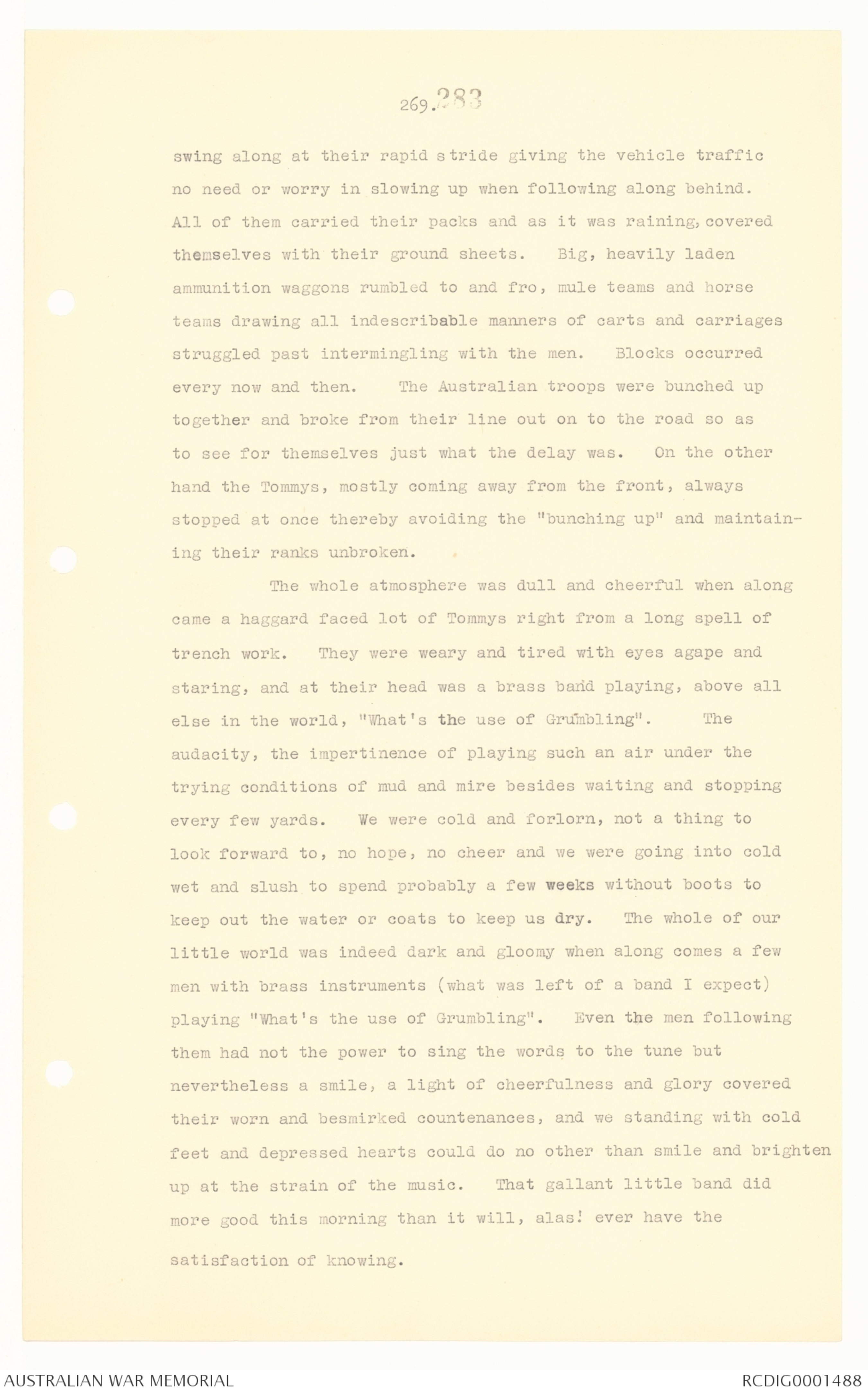
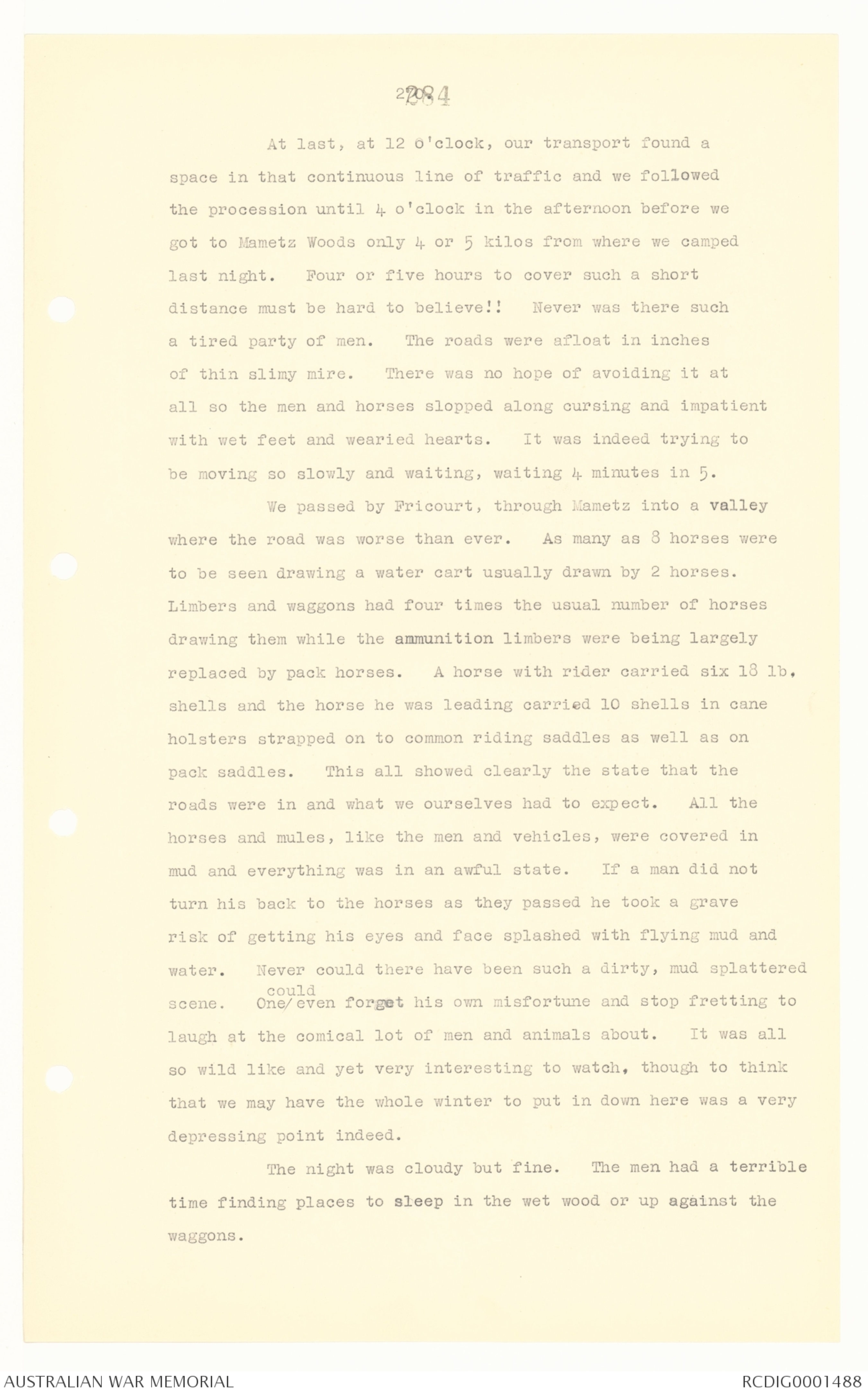
261 275
Men with large families come away and are either killed
or disabled and their wives and whole families are thrown
upon the State for support and help, which means that the
taxes which we (soldiers included) will have to pay when
the war is over, is going to be very much higher than there
is any need to be. You might say that a man is a fool to
enlist if he does not want to and all that sort of thing,
but yet what man with a soul can read his paper or go out
to any kind of a function and hear the "call of his country",
listen to remarks concerning shirkers and slackers, and even
be asked "why aren't you in uniform". It must be a terrible
task to read of "Your Country Needs You", "Your Country is in
Danger and Wants Help!! Wont You Help? Wont You do Your Bit?"
As I have said no man is worth the name who could resist such
appeals and the result we who have been through the whole
business know only too well.
Then again what kind of stock are you going to build
up your future Australia on if it is depleted of the soundest
and best men, men who readily come forward, take their lives
in their hands and die for their Nation's honour. But, alas,
the point that bothers me now is will conscription not be too
late? Will the men submit to it now? We have made a great
mistake in not chosing and picking our fighting forces right
from the very start and then there would be an easy going
systematic flow of men from all ranks and classes throughly
balanced and ready for the worst. Conscription such as France
and Germany has tolerated for years I would decry with all my
strength in Australia, but conscription in the time of war is
absolutely essential; not so much, or at all, in fact, to force
men to come away but simply to regulate the flow and to be
thoroughly organised and prepared for the worst.
The extreme Labour men with ideas that all industry,
in fact everything, should be nationalisation and run by the
Government is the chief objector to conscription, and after all
does not nationalisation and conscription mean actually the same
262
thing. I would not vote for conscription if I thought
that it meant sending more of our men over to die. I
believe even our politicians would not foolishly throw
away our little bit of population recklessly and foolishly.
October 18th. Wednesday (Pay day)
The surrounding evidences show clearly that the
Somme is to be our destination. Nobody is upset or worried
about it, although we know it will be certain death or injury
to 50% or more of our forces. Our battalions are not yet
up to strength and a survey of the situation seems to disclose
a scheme of wanton destruction to send our ragged men back
there again.
In this little village without a store or shop
worthy of the name, it seems very strange and decidedly hard
on the "level goes" and honest soldiers to find that rum and
whiskey can be obtained quite openly and that the unworthy
few are buying and drinking the filthy stuff and degrading
both themselves and their comrades. It's a shame!!
After a whole lot of waiting at a farm house, five
of us got quite a good and homely tea. We had to provide
our own vegetables and meat, tinned, the girls doing up some
chips and coffee. There were three girls and the aged
mother at home but no men folk. They seemed quite happy and
when we offered them 1½ francs, 7 francs total, there was a
whole lot of trouble in getting them to take it. "No! they
argued, "5 francs plenty". The house was the usual poor
farmer's home, a concrete floor with stout uprights and strong
rafters formed a skeleton and basis which would last for ever
almost. The walls were filled in with laths and a poor cement
or mud, which would, after a few years, need renewing. The
whole structure was cheap, effective and comfortable.
While in having tea some 12th Infantry chaps came
along and in their own manner cried down conscription and
cursed the military folk for the treatment they were receiving,
263
as well as expressing a hope that no more Australians would
ever be brought into a hole and be hacked about like they
have been. "Oh no! very few votes in our company will
favour conscription", one of them said. I am very sorry
indeed that I did not find out how long these men have been
on active service. I fancy they are only new arrivals.
New men mostly squeak.
October 19th. Thursday. Two years ago to-day we went
aboard the "Euripides" in
Sydney Harbour.
The office sent for my paybook a couple of days ago
and to my surprise entered up 6/- fare from London to Folkestone.
I lost the ticket and told the fellows at the railway station.
He wanted me to either pay up 6/- then, or go to the "Guard Room".
I unhesitatingly chose the "Guard Room" to the surprise of the
station hands. I said "to pay ones own fare back to the slush
and misery of Belguim is over the odds and I wont pay up thats
all about it, now do as you like". They took my name and unit
and let me go. Then comes along a statement to claim the fare
and now its entered up in my book. Had it been a fare to or
for anywhere else but the firing line and having lost the ticket
I would have paid up with a smile, or had it been a passenger
train instead of an ordinary troop train all might have been
different. However, it is entered up in my overdrawn paybook
now, and if I can by some means or other keep that paybook as a
souvenir I will be satisfied.
It is cold and dreary to-day, raining sharply at
intervals and beyond my tolerance at the present juncture as
I have a boi1 right where I sit down, that part of the anatomy
which one must uses on a day like to-day as it is so frightfully
unpleasant walking about.
In the river stream nearby our men have been using
bombs to blow up fish. I don’t know if they had any luck or
not, but the men who would go into that water to-day for fish
deserve fish of the best and finest quality.
264
This afternoon at teatime, I heard cheers and counter
cheers, shouts of excitement and encouragement, yells of
disappointment and reverse. I thought to myself there must
be some unusual happenings going on over there. At the risk
of losing my tea, I slopped across the low lying fields to the
rustic bridge spanning the narrow river. Here the cause of so
much hilarity and hearty vents of enthusiasm was easily found
to be encasing a football match.
The wind was blowing sharp and strong as I stood on
the bridge and watched the young fellows giving voice to their
feelings with the same youthful power of lung as though it were
a big college game back in their sunny homeland.
I was extremely thankful for the protection afforded
me by a heavy top coat, but those hardy spectators had only a
water sheet thrown cape fashion over their shoulders to/ward off
the rain. Many of these sheets were used to wave encouragement
to the respective sides, and the onlookers with their
characteristic hardiness took no notice of the biting wind.
The contesting team was from the 12th Battalion
A Company, versus the Bombers. The surroundings were almost
Australian in their appearance. The playing field was roomy
and the grass delightful both in its softness and colour. A
rough hedge of hawthorn and fruit bearing blackberry bushes
protected one side and end, a row of tall majestic trees towered
close to the other side and the watercressed banks of the river
framed off the end. Some cows browsing in the field continually
called, after the manner of such animals, for their offsprings
and added a bush effect that must have been an unconscious under-
current to urge on those valiant athletes to fight relentlessly
for the honour, the prestige of each particular section.
Tomorrow, why tomorrow they will be en route for the Somme and
the greatest Hell ever thought of, greater even than man's
imagination is capable of conceiving. But what care they for
the morrow, lets first find out who are the best footballers while
there is still time in hand. So along the field the ball
265
travelled with speed and precision, first up one side and
down the other, across the field and back again, each piece
of good play being awarded its due recompense from the keen
supporters on the respective sides. The kicking, fielding
and marking was surprisingly good. Goals came very slowly,
so keen and buoyed up was the defence. No player dare make
a mistake, in his mess he would obtain no peace for weeks
should he fail to keep up his end.
No international match was more keenly fought out,
and as the defeated side came off the field their friends went
over and sympathised in the manner of true sportsman and noble
soldiers. They had played a good game!! At the bloody Somme
any day now both conqueror and vanquished will fight a different
fight where rules do not govern the struggle and God alone is
the referee.
October 20th. Friday. Sailed down Sydney Harbour in the
mist two years ago. How longingly
I looked towards Manly.
The more I see of the surrounding country and rake up
comparisons with other lands, the more English like the setting
becomes, and yet in the matter of open spaces, that is, lack of
fences, there is a more Australian aspect about the landscape.
But in colour and leafy bushy ruggedness it is English. Then
again it is difficult to call it English or liken the surround-
ings to any country, so much so that I have come to the conclusion
that it is French landscape scenery. One of the distinctly
different kinds to other parts in Flanders, in Picardy, on the
west coast or away down south, there are strange and striking
differences in the types and outlook of the country.
At 4 p.m. we left Nordasques after spending one of the
coldest nights in my experience. I slept on the floor of the
ambulance waggon while Kensett and Sands slept on stretchers on
the seats. I had any number of blankets, but blankets seemed
to avail nothing, the cold just leaked through and settled on my
feet. Frost lay thickly on the ground everywhere and it was
266
after breakfast when I ventured about my morning's bath.
The weather was pleasant as we got on the march but
on stopping for tea along the roadside it got very cold,
and the stars shone with greater brilliancy than ever through
the frost laden atmosphere.
The bearers marched along at a swinging pace whistling
and singing triumphantly. It was fully 9 p.m. as we came into
St. Omer and landed ourselves onto the railway station. The
getting of the waggons aboard was well and quickly done, but
as the drivers were in all stages of drunkedness the horses
took a long time and were troublesome.
Transport men are always a rough lot. Man's
associations with horses usually has a bad effect, but I
most sincerely hope that all transport sections are not so
loathsome, so unprincipled and unconsiderate as ours is.
It would indeed go hard to think that they were all alike,
but our men are certainly bad, steal and thieve anything
from their comrades as eagerly as from others.
The night in the train was awfully cold and when I
woke from the waggon at daybreak we were at Abberville.
An hour later we were detraining.
October 21st. Saturday.
It was cold and the men were hungry also as the waggons
were taken from the railway trucks at Longpre. I did, after
a whole lot of trouble with the cafe keepers, get a drink of
coffee and rum, and another without the rum, and it was jolly
good indeed.
We formed up and marched some 4 miles to Bouchon a
village snugly nestling down in a valley midst tall trees and
fruit trees that it was difficult to recognise any village at
all.
In the afternoon Ned Reynolds and I went into a nearby
village to do a little shopping. After alot of walking and
trouble I did get a tooth brush and paste, some soap and bread,
267.
also two tins of sardines. Throughout this village there
was a total absence of men of any kind. I have often
noticed this fact in French villages, but there are occasions
when a manless town appeals more strongly and seems more
pathetic. This was one of those occasions, emphasised no
doubt by the number of women I saw about.
October 22nd. Sunday.
This has been the most unsabbath like day I have
spent for a very long time. By 9 a.m. we (the transport
section only) were on the march. Our route was through
Fixecourt to within 4 miles of Ameins, into which city many
of our men cleared and had a good night. I certainly would
have gone also but for the fact that I have been much
troubled by a boil for some days now, and as it is very
difficult to sit down, lie down or either stand up so
awkwardly situated is the torment, I was satisfied to stay
in our own little village. Phil Thomas called and we recalled
many old stories. There did not seem to be the same amount
of bell ringing or men and women going about in their best
clothes as is so common up towards Belgium.
While we were standing along the roadside having
lunch, a car with a red flag in front told the fellows around
that a General was coming. They commented on the fact, and
to be military like the five fellows about would have stood
to attention, but not one of them did so; they started looking
into the waggon or over the horses.
October 23. Monday.
Up at daylight and by 7 o'clock we were walking the
waggons along the road towards Ameins. It was hard to walk
through the thickly populated suburb without going into the
city proper. I am badly off for a pair of gloves just now
and would love to be able to buy a pair.
There was not much frost last night so that it was
not as cold as usual.
268
Along the tram line was a double row of splendid
poplar trees fronting the cemetery while on the opposite
side were flower shops all looking so neat and refreshing.
It seems a tremendous oversight for a unit like
ours not to have a travelling kitchen so as to have hot
water for use along the road, as they are worth their weight
in gold. Many of the Australian units have them, and it is
strange that a Field Ambulance has none.
We have travelled some 29 miles to-day and as all
of our 14 waggons are heavily laden you can gues the horses
are very tired to-night as I prepared for the night near
Fricourt.
Along the road there were several hundreds of
German prisoners engaged in road making. A fair crowd of
men only probably the same size etc. as the average Tommy
but I doubt if the Germans were as well developed or as
sturdy.
October 24th. Tuesday.
To-day has been one of the most remarkable days.
After pulling the waggons through heavy mud and deep ruts by
hooking on one or two pairs of spare horses and getting them
into line midst slosh and mire, it commenced to rain.
The transport men had to sleep where they could.
The bearer section travelled by those huge rumbling motor cars
driven by Frenchmen. I have not seen them for a long time
now.
At 10 a.m. we were harnessed up and waiting at the
roadside for a chance to get on to the road. For two hours
we waited before there was a gap in the line of traffic for
us to get in, and along our journey.
While waiting there were a whole lot of wonderful
scenes being enacted along the road.
Companies of Australians (1st Divisions) marched by
caring not a jot for their step or proper marching. They just
269
swing along at their rapid stride giving the vehicle traffic
no need or worry in slowing up when following along behind.
All of them carried their packs and as it was raining, covered
themselves with their ground sheets. Big, heavily laden
ammunition waggons rumbled to and fro, mule teams and horse
teams drawing all indescribable manners of carts and carriages
struggled past intermingling with the men. Blocks occurred
every now and then. The Australian troops were bunched up
together and broke from their line out on to the road so as
to see for themselves just what the delay was. On the other
hand the Tommys, mostly coming away from the front, always
stopped at once thereby avoiding the "bunching up" and maintain-
ing their ranks unbroken.
The whole atmosphere was dull and cheerful when along
came a haggard faced lot of Tommys right from a long spell of
trench work. They were weary and tired with eyes agape and
staring, and at their head was a brass band playing, above all
else in the world, "What's the use of Grumbling". The
audacity, the impertinence of playing such an air under the
trying conditions of mud and mire besides waiting and stopping
every few yards. We were cold and forlorn, not a thing to
look forward to, no hope, no cheer and we were going into cold
wet and slush to spend probably a few weeks without boots to
keep out the water or coats to keep us dry. The whole of of our
little world was indeed dark and gloomy when along comes a few
men with brass instruments (what was left of a band I expect)
playing "What's the use of Grumbling". Even the men following
them had not the power to sing the words to the tune but
nevertheless a smile, a light of cheerfulness and glory covered
their worn and besmirked countenances, and we standing with cold
feet and depressed hearts could do no other than smile and brighten
up at the strain of the music. That gallant little band did
more good this morning than it will, alas! ever have the
satisfaction of knowing.
270
At last, at 12 o'clock, our transport found a
space in that continuous line of traffic and we followed
the procession until 4 o'clock in the afternoon before we
got to Mametz Woods only 4 or 5 kilos from where we camped
last night. Four or five hours to cover such a short
distance must be hard to believe!! Never was there such
a tired party of men. The roads were afloat in inches
of thin slimy mire. There was no hope of avoiding it at
all so the men and horses slopped along cursing and impatient
with wet feet and wearied hearts. It was indeed trying to
be moving so slowly and waiting, waiting 4 minutes in 5.
We passed by Fricourt, through Mametz into a valley
where the road was worse than ever. As many as 8 horses were
to be seen drawing a water cart usually drawn by 2 horses.
Limbers and waggons had four times the usual number of horses
drawing them while the ammunition limbers were being largely
replaced by pack horses. A horse with rider carried six 18 lb.
shells and the horse he was leading carried 10 shells in cane
holsters strapped on to common riding saddles as well as on
pack saddles. This all showed clearly the state that the
roads were in and what we ourselves had to expect. All the
horses and mules, like the men and vehicles, were covered in
mud and everything was in an awful state. If a man did not
turn his back to the horses as they passed he took a grave
risk of getting his eyes and face splashed with flying mud and
water. Never could there have been such a dirty, mud splattered
scene. One/could even forget his own misfortune and stop fretting to
laugh at the comical lot of men and animals about. It was all
so wild like and yet very interesting to watch, though to think
that we may have the whole winter to put in down here was a very
depressing point indeed.
The night was cloudy but fine. The men had a terrible
time finding places to sleep in the wet wood or up against the
waggons.
 Sam scott
Sam scottThis transcription item is now locked to you for editing. To release the lock either Save your changes or Cancel.
This lock will be automatically released after 60 minutes of inactivity.